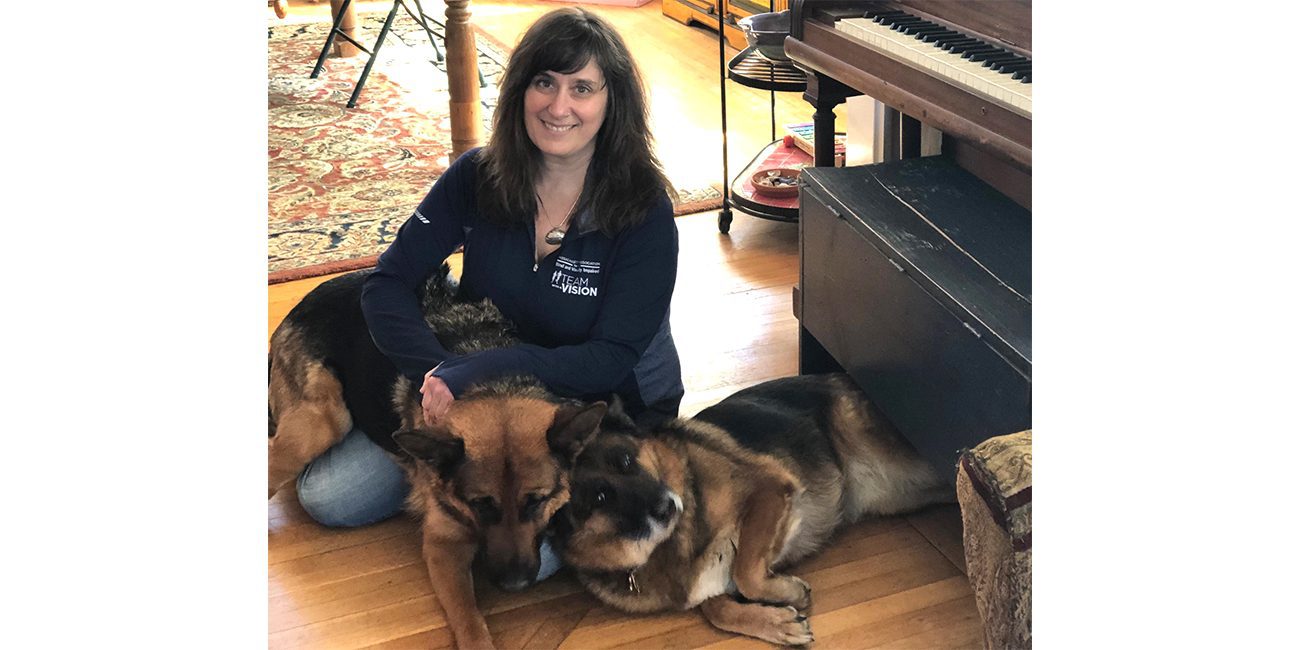NAHANT — It’s not as if Ellen Goldberg is jumping up and down at the prospect of running her 10th straight Boston Marathon. She’s always been a bit ambivalent about it.
“I just can’t seem to say ‘no,'” she said as she prepares for another 26-mile, 285-yard trek through Boston’s western suburbs. “I say I’m done. I tell my kids to remind me ‘no more marathons.’ Then, I get a phone call, and next thing you know…”
That phone call first came from her former sister-in-law, who is connected with the Massachusetts Association for the Blind, telling her there was an extra number available to raise money, and run, on behalf of the group. Goldberg grew up with vision issues, so this seemed like a natural fit, especially for someone who had experience running long races (this will be her 13th marathon overall).
So when the phone call inevitably comes, asking her to re-up, she does.
“Then I start training, and I find myself asking ‘what am I thinking?’ I’m fortunate that I haven’t had major injuries in all this time.
“On the other hand,” she said, “I’ve built a long list of supporters, and I’ve built a history of running the race. It’s something I feel as if I can do to contribute. There aren’t many other opportunities where you can build to that kind of a contribution.”
In Goldberg’s case, that contribution — if she meets her $10,000 goal — will scrape $85,000 in the time she’s run the race.
As for the race itself, which will be run this year on April 15, she finds it difficult to offer any pre-race advice because she can’t figure it out herself.
“You cannot assume anything,” she says. “Anything can happen. All I ever do is get to the starting line and hope I can finish.”
Of course, once the race starts, competitive instinct and determination soon take over.
“I say to myself that there’s no way I’m going to come this far and not finish,” she said. “And I always have this dark fantasies that I’m going to trip on Boylston Street or something and end up crawling to the finish line.”
Of all the variables that make the race to difficult to plan for, No. 1 is the weather.
“It affects everything — especially what you wear,” she said.
And if you’re running 26 miles, you’re not looking to be a fashionista, she said. It’s strictly functional.
“For me,” she said, “I don’t wear a hat usually. I don’t like wearing hats. I’ll wear shorts and a tank top even if it’s in the 40s. Because at some point, you’re going to heat up, and you don’t want to overheat.”
Like most runners, Goldberg can do without hot days — and for her that means anything from the high 50s on up.
“The perfect day for me is high 40s with a slight rain,” she said. “Not a monsoon (like last year), but a slight rain. I love it.”
And she’s no fan of the sun — at least for the five hours it takes her to complete the race (“I’m not looking to set speed records,” she says).
“We’re lucky because we are running west to east, and the race starts for us around noon,” she said. “The sun’s usually behind us.”
Her only problem with the sun is when it’s in her eyes, although “you can get a pretty good sunburn on the neck and your shoulders.”
But she doesn’t wear sunscreen because “I just don’t like the feel of it on me.”
Beyond feeling as if she’s contributing to a good cause, Goldberg runs the race “to test my mettle. Every time I do it, it’s a new problem to solve. How do you handle it? It has become what I do — at least for now.”
There are times, she said, when the race seems endless.
“You’ve already run a half-marathon, and you look up, and you still have 13 miles to go, plus the hills. It can be very easy to spiral into a bad place. You can really hit some lows.”
In fact, she said, managing emotions might be among the toughest parts of the race.
“You can get really high, too,” she said, “especially when you’ve just gone by a large crowd that’s shouting encouragement. You have to manage that, too, just like the low points.”
If there is one bit of advice she could give, “it’s to allow yourself to connect with all the people along the way, because that connection is what makes the marathon what it is. It’s almost like an ecosystem in that my job is to run, your job is to cheer me on. And we’re all part of the same process. And if everyone does their jobs, it is a wonderful experience.
“So allow yourself not to be alone,” she said.

